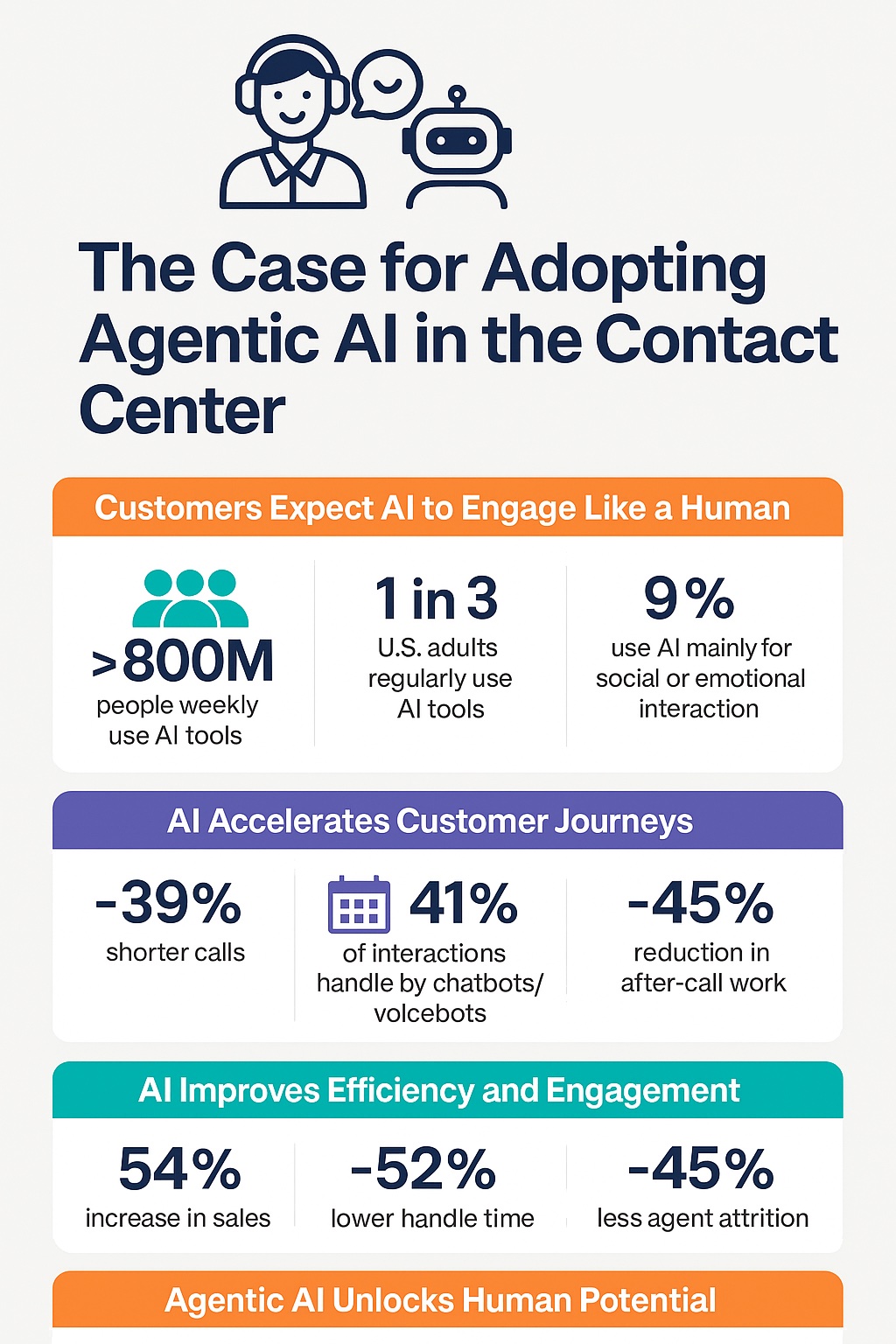Customer expectations are shifting faster than most organizations can keep up with. Hybrid work, rising digital volume, complex support journeys, and growing security demands have stretched customer service teams to their limits. Leaders in SMB and MidMarket organizations feel it every day: long handle times, stressed employees, inconsistent experiences, and customers who expect instant, personalized answers at any hour.
Yet a breakthrough is happening quietly—and rapidly. AI is no longer an experimental add-on. It’s becoming a trusted partner to human operators, transforming how work gets done, how customers engage, and how businesses compete.
Two recent sources shine a light on this shift. A Washington Post analysis of 47,000 AI conversations uncovered how deeply people already rely on AI for meaningful, natural interactions. And a comprehensive Metrigy study and available from RingCentral found that companies using AI in customer experience are seeing dramatic improvements in efficiency, employee proficiency, and customer satisfaction.
Together, these insights form a single clear conclusion: Agentic AI isn’t the future of customer engagement—it’s the present. And cloud communications platforms like those from RingCentral are how businesses stay resilient, responsive, and competitive in this new era.
AI Has Become a Trusted Conversational Tool—And Customers Expect Businesses to Keep Up
The Washington Post analysis revealed something remarkable: People don’t use AI just for simple tasks. They use it for complex, emotional, and deeply human conversations. Users asked AI for relationship advice, to help analyze life situations, and even for emotional support.
This matters. Because it means customers have already normalized conversational AI as part of their everyday life. The article notes:
- Over 800 million people use ChatGPT each week.
- One-third of U.S. adults use AI tools regularly.
- Nearly 1 in 10 use AI primarily for social or emotional interaction.
- Users expect AI to be empathetic, contextual, and responsive.
And perhaps most importantly: People form emotional bonds with AI because it adapts to their tone, intent, and communication style.
This is exactly what customer service has always aimed to do—and exactly where many contact centers struggle due to staffing constraints, high turnover, and inconsistent agent skill levels.
If customers already trust AI in their personal lives, they will expect businesses to leverage it as well. The market is already shifting, and Central Pennsylvania companies who wait will simply fall behind.
The Business Case for AI in the Contact Center Is No Longer Optional
The Metrigy research confirms what leading contact centers already know: AI isn’t a “nice to have.” It’s a measurable driver of business performance.
Among 697 companies studied: AI correlates directly with higher performance
Organizations in the “success group” (those with above-average improvements in core CX metrics) are twice as likely to use AI extensively for both customer and employee interactions.
AI adoption is accelerating
Nearly half of companies already use AI for customer or employee interactions. And companies are investing heavily:
- $3.3M average annual spending on AI for CX and EX
- AI spending expected to grow 42.5% in 2025
AI reduces resource strain
Agent turnover is surging—projected to hit 31.2% in 2024, up from 21.8% in 2022. Yet AI helped companies hire 89% fewer agents because automation absorbed so much of the workload.
AI speeds up every part of the customer journey
The study reveals:
- Calls are 39% shorter on average
- After-call work drops from 16.2 minutes to 10.4 minutes
- Voicebot and chatbot automation resolves 41% of all interactions, and 51.5% in top-performing organizations
Agent Assist tools deliver measurable success
Companies using Agent Assist see:
- 60.7% improvement in customer satisfaction
- 52.9% reduction in average handle time
- 54.1% increase in sales
- 45.3% reduction in attrition
For any CEO, CIO, COO, or CX leader—these are bottom-line results.
Agentic AI: The Next Evolution of Customer Engagement
Most AI tools today act as helpers. Agentic AI goes further. It takes action. Agentic AI observes customer intent, retrieves relevant information, executes tasks, recommends next steps, and interacts naturally—without requiring manual triggers or rigid decision trees.
This aligns perfectly with what customers already expect based on their everyday use of generative AI tools. The Washington Post piece revealed that people naturally engage AI with the same expectations they have of a human conversation partner—fluidity, context, empathy, and initiative.
When you combine that behavioral shift with Metrigy’s performance data, the conclusion is clear: Agentic AI isn’t replacing humans—it’s unlocking them.
It gives agents:
- Real-time guidance
- Automatic summarization
- Up-to-date customer context
- Suggested next steps
- Compliance guardrails
- Upsell and cross-sell recommendations
And it gives supervisors:
- Automated quality scoring
- Simplified scheduling
- Early detection of coaching needs
- Consistent performance metrics
A New Standard for Customer Engagement
Your customers already use AI.
Your employees already expect AI support.
Your competitors are already deploying AI to improve efficiency and lower costs.
The only question is whether your Central Pennsylvania business will keep pace.
The shift to agentic AI is not an experiment—it’s a competitive necessity.
As the Metrigy report notes, the companies seeing the highest gains in satisfaction, resolution rates, cost reduction, and employee performance are the ones deploying AI the most deeply.
And as the Washington Post analysis shows, customers are more than ready to engage with AI in deeper, more meaningful ways.
Cloud communications UCaaS | CCaaS sit at the intersection of these two forces: the behavioral shift in how people engage with AI—and the operational shift in how businesses must adapt.
AI Won’t Replace Human Connection—It Will Amplify It
The narrative that “AI replaces humans” misses the point.
What AI actually does—especially agentic AI —is remove the barriers that keep humans from doing their best work. It clears away manual tasks, lowers stress, provides context, and helps agents bring humanity back to the customer experience.
In a world where customers crave fast answers, empathy, and consistency, AI and humans aren’t competitors.
They’re partners. In the same way that Morefield is your partner for smart technology decisions for your business
And the Central PA businesses who embrace this partnership today will define the next decade of customer engagement.

